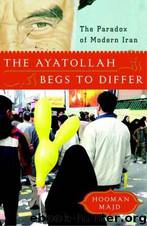The Ayatollah begs to differ: the paradox of modern Iran by Hooman Majd

Author:Hooman Majd
Language: eng
Format: mobi
Tags: International relations, Social Science, Government, Travel, Iranian Americans, Islamic Studies, General, Anthropology, Religion, Cultural, Middle East, Political Science, Politics, Politics & State, International, Iran, Biography, History
ISBN: 9780385523349
Publisher: Random House, Inc.
Published: 2008-01-15T21:54:50.847000+00:00
The parade at the mosque continued. Different groups of men, sometimes even very young boys, were marching past me, each group headed by a flag bearer and each group stepping and self-flagellating to a different song and beat. The officious policeman, acting as traffic cop with almost as many hand and arm movements, was thoroughly enjoying himself, although it seemed that his instructions were ignored as many times as they were obeyed. Each neighborhood in Yazd, and apparently many neighborhoods in the surrounding villages, had its own heyyat, or “delegation,” competing, it seemed, to out-beat and out-sing the others. The Afghans came, refugees first from the Soviets and then from the Taliban who had never returned home, as did the Iraqis, presumably from the Iraqi part of town, near the main square, where they run the cigarette wholesale business and where, much to my delight, I could buy Iranian cigarettes re-smuggled back into Iran from Iraq—where the Iranian government subsidizes their distribution—at half the price of anywhere in Tehran, or about thirty-five cents a pack. Every now and then the parade would stop, someone new would take to the microphone, and the crowd of men sitting cross-legged in the middle of the room would stand and beat their chests with both arms. Arms would be raised high and then brought down, crossing each other in midair and landing heavily on either side of the chest, to a rhythm created by the singer and a chorus repeated by the men. Everyone else in the mosque beat, or in my case tapped, their hearts in time. Everyone, that is, except for the few men I noticed who answered calls on their cell phones, although one did manage to hold a conversation and beat himself at the same time. “Hey, what are you doing, Mamad?” I imagined the conversation. “Oh, nothing much, just pounding my chest.”
The women on the balcony watched, some leaning over to get a better look, and at times I felt that the men, the youths anyway, were performing for them as much as for any other reason. If they could (and if it was still legal), some of these men would have used the ghammeh, or “sharp dagger,” to cut their foreheads and march with blood streaming down their faces. Once a common practice, it was now forbidden by the Ayatollahs of Shia Islam.1 On the eve of Tasua, in a taxi from Ardakan to Yazd, a newscaster repeatedly advised his listeners (after offering them all condolences on the death of Imam Hossein) that ghammeh-zani, “cutting oneself with a blade,” was not only illegal but un-Islamic according to the great Ayatollahs, including Fazel Lankarani, Shirazi, Sistani (in Iraq), and the Supreme Leader himself, Khamenei. The reason, as he quoted the mullahs, was that in Islam it is haram, or “forbidden,” to harm one’s own body to the point of danger—that is, danger from death due to, in this case, a potential deadly infection. He neglected to mention the Ayatollahs’
Download
This site does not store any files on its server. We only index and link to content provided by other sites. Please contact the content providers to delete copyright contents if any and email us, we'll remove relevant links or contents immediately.
| Arms Control | Diplomacy |
| Security | Trades & Tariffs |
| Treaties | African |
| Asian | Australian & Oceanian |
| Canadian | Caribbean & Latin American |
| European | Middle Eastern |
| Russian & Former Soviet Union |
The Secret History by Donna Tartt(16725)
The Social Justice Warrior Handbook by Lisa De Pasquale(11508)
Thirteen Reasons Why by Jay Asher(7834)
This Is How You Lose Her by Junot Diaz(5830)
Weapons of Math Destruction by Cathy O'Neil(5081)
Zero to One by Peter Thiel(4869)
The Myth of the Strong Leader by Archie Brown(4810)
Promise Me, Dad by Joe Biden(4480)
Beartown by Fredrik Backman(4466)
How Democracies Die by Steven Levitsky & Daniel Ziblatt(4450)
Stone's Rules by Roger Stone(4440)
The Fire Next Time by James Baldwin(4375)
100 Deadly Skills by Clint Emerson(4112)
A Higher Loyalty: Truth, Lies, and Leadership by James Comey(4061)
Rise and Kill First by Ronen Bergman(4049)
The David Icke Guide to the Global Conspiracy (and how to end it) by David Icke(3915)
The Farm by Tom Rob Smith(3896)
Secrecy World by Jake Bernstein(3811)
The Doomsday Machine by Daniel Ellsberg(3761)
